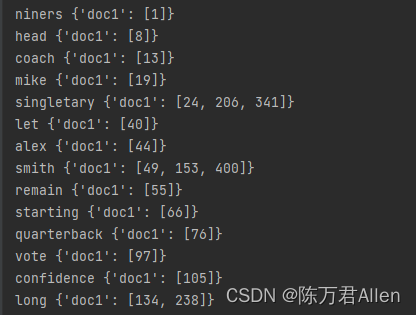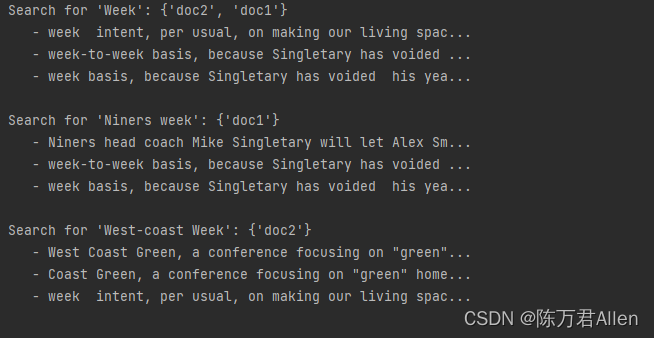推荐系统
注:大家觉得博客好的话,别忘了点赞收藏呀,本人每周都会更新关于人工智能和大数据相关的内容,内容多为原创,Python Java Scala SQL 代码,CV NLP 推荐系统等,Spark Flink Kafka Hbase Hive Flume等等~写的都是纯干货,各种顶会的论文解读,一起进步。
今天继续和大家分享一下倒排索引实现文章关键字搜索
#博学谷IT学习技术支持
前言
倒排索引在是很常见的算法,比如在ES中默认就是倒排索引,其思想是通过空间来换取时间。
一、倒排索引
from functools import reduce
_WORD_MIN_LENGTH = 3
# 停用词自己根据情况加
_STOP_WORDS = frozenset([
'a', 'about', 'above', 'above', 'across', 'after', 'afterwards', 'again','yourselves', 'the'])
# 单词切分
def word_split(text):
"""
Split a text in words. Returns a list of tuple that contains
(word, location) location is the starting byte position of the word.
"""
word_list = []
wcurrent = []
windex = None
for i, c in enumerate(text):
if c.isalnum():
wcurrent.append(c)
windex = i
elif wcurrent:
word = u''.join(wcurrent)
word_list.append((windex - len(word) + 1, word))
wcurrent = []
if wcurrent:
word = u''.join(wcurrent)
word_list.append((windex - len(word) + 1, word))
return word_list
# 单词清洗,去除停用词
def words_cleanup(words):
"""
Remove words with length less then a minimum and stopwords.
"""
cleaned_words = []
for index, word in words:
if len(word) < _WORD_MIN_LENGTH or word in _STOP_WORDS:
continue
cleaned_words.append((index, word))
return cleaned_words
# 单词转小写归一化
def words_normalize(words):
"""
Do a normalization precess on words. In this case is just a tolower(),
but you can add accents stripping, convert to singular and so on...
"""
normalized_words = []
for index, word in words:
wnormalized = word.lower()
normalized_words.append((index, wnormalized))
return normalized_words
def word_index(text):
"""
Just a helper method to process a text.
It calls word split, normalize and cleanup.
"""
words = word_split(text)
words = words_normalize(words)
words = words_cleanup(words)
return words
def inverted_index(text):
"""
Create an Inverted-Index of the specified text document.
{
word:[locations]}
"""
inverted = {
}
for index, word in word_index(text):
locations = inverted.setdefault(word, [])
locations.append(index)
return inverted
def inverted_index_add(inverted, doc_id, doc_index):
"""
Add Invertd-Index doc_index of the document doc_id to the
Multi-Document Inverted-Index (inverted),
using doc_id as document identifier.
{
word:{
doc_id:[locations]}}
"""
for word, locations in doc_index.items():
indices = inverted.setdefault(word, {
})
indices[doc_id] = locations
return inverted
def search(inverted, query):
"""
Returns a set of documents id that contains all the words in your query.
"""
words = [word for _, word in word_index(query) if word in inverted]
results = [set(inverted[word].keys()) for word in words]
return reduce(lambda x, y: x & y, results) if results else []
if __name__ == '__main__':
doc1 = """
Niners head coach Mike Singletary will let Alex Smith remain his starting
quarterback, but his vote of confidence is anything but a long-term mandate.
Smith now will work on a week-to-week basis, because Singletary has voided
his year-long lease on the job.
"I think from this point on, you have to do what's best for the football team,"
Singletary said Monday, one day after threatening to bench Smith during a
27-24 loss to the visiting Eagles.
"""
doc2 = """
The fifth edition of West Coast Green, a conference focusing on "green" home
innovations and products, rolled into San Francisco's Fort Mason last week
intent, per usual, on making our living spaces more environmentally friendly
- one used-tire house at a time.
To that end, there were presentations on topics such as water efficiency and
the burgeoning future of Net Zero-rated buildings that consume no energy and
produce no carbon emissions.
"""
# Build Inverted-Index for documents
inverted = {
}
documents = {
'doc1': doc1, 'doc2': doc2}
for doc_id, text in documents.items():
doc_index = inverted_index(text)
inverted_index_add(inverted, doc_id, doc_index)
# Print Inverted-Index
for word, doc_locations in inverted.items():
print(word, doc_locations)
# Search something and print results
queries = ['Week', 'Niners week', 'West-coast Week']
for query in queries:
result_docs = search(inverted, query)
print("Search for '%s': %r" % (query, result_docs))
for _, word in word_index(query):
def extract_text(doc, index):
return documents[doc][index:index + 50].replace('\n', ' ')
for doc in result_docs:
for index in inverted[word][doc]:
print(' - %s...' % extract_text(doc, index))
print()
得到的倒排索引表

得到搜索关键字queries = [‘Week’, ‘Niners week’, ‘West-coast Week’]
所在的文章

总结
ES中也是通过倒排索引表,更快的解锁到单词的位置。思想是空间换时间。